|
|
|
Sort Order |
|
|
|
Items / Page
|
|
|
|
|
|
|
| Srl | Item |
| 1 |
ID:
100729
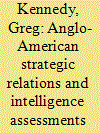

|
|
|
|
|
| Publication |
2010.
|
| Summary/Abstract |
The historiography of Western intelligence assessments of Japanese military power and prowess, particularly before the Pearl Harbor attack in December 1941, is littered with accusations of racism, ignorance, arrogance, and incompetence, which are portrayed as having created one of the most serious underestimations of a modern power's military capabilities. However, cultural and racial biases will always exist in professional military establishments because their competitiveness and emphasis on morale lead some untrained minds to undervalue systems possessing values different from their own. This article will reassess the influences of racism on Anglo-American appreciations of Japanese air power, and its development, in the seven years before the attack on Pearl Harbor.
|
|
|
|
|
|
|
|
|
|
|
|
|
|
|
|
| 2 |
ID:
122401
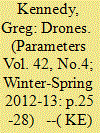

|
|
|
|
|
| Publication |
2012-13.
|
| Summary/Abstract |
The appearance of new weapons' technologies often gives rise
to questions of legitimacy. The use of missile weapons against
armored knights was considered illegitimate and unchivalrous by
some, as well as a destabilizing influence on the conduct of civilized
warfare. An acknowledged and accepted set of rules, designed to limit the
vulnerability of the ruling elite in combat, made longbow and crossbow
technology illegitimate in the eyes of that warrior-class.1
German U-boat
actions against commerce in World War I, the use of aerial bombardment against civilian populations, and defoliation agents in Vietnam, are
modern examples of new technologies whose legitimacy was contested
in times of conflict.2
|
|
|
|
|
|
|
|
|
|
|
|
|
|
|
|
| 3 |
ID:
048879


|
|
|
|
|
| Publication |
London, Frank Cass, 1996.
|
| Description |
228p.
|
| Standard Number |
0714646830
|
|
|
|
|
|
|
|
|
|
|
|
Copies: C:1/I:0,R:0,Q:0
Circulation
| Accession# | Call# | Current Location | Status | Policy | Location |
| 039431 | 359.033541/KEN 039431 | Main | On Shelf | General | |
|
|
|
|
| 4 |
ID:
126369
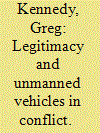

|
|
|
|
|
| Publication |
2013.
|
| Summary/Abstract |
In this article the author points out many contradictory elements of the use of drones for targeted killing that clash with stated desired outcomes of American foreign policy. He argues that through the use of such technologies the US quest for better international relations is unlikely, given the contradictory nature of American calls for other nations to abide by international law, while at the same time using drones for targeted killings in a fashion that many in the international community see as being outside of the accepted rules of international conduct. Finally, he argues that the use of such drone strikes has the potential to alienate British public opinion and therefore British policy-makers, thus creating friction in the Anglo-American strategic relationship.
|
|
|
|
|
|
|
|
|
|
|
|
|
|
|
|
| 5 |
ID:
082456
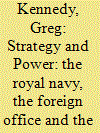

|
|
|
|
|
| Publication |
2008.
|
| Summary/Abstract |
Conventional wisdom, and much of the existing literature, puts the Royal
Navy at the centre of Britain's World War I blockade strategy. This article
argues that such was not the case. While operationally the RN was
central, strategically it was the Foreign Office that controlled the strategic
direction of the blockade. Indeed, given the political dimensions of any
blockade it is questionable that any such activity is ever the sole domain of
a navy. Relying on primary sources this article highlights competing
strategic frictions that existed in the British comprehensive approach to
formulating a viable blockade strategy, how they were overcome, and
what costs such
|
|
|
|
|
|
|
|
|
|
|
|
|
|
|
|
| 6 |
ID:
047923
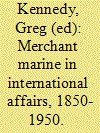

|
|
|
|
|
| Publication |
London, Frank Cass Publishers, 2000.
|
| Description |
x, 216p.
|
| Series |
Cass series-naval policy and history; no.8
|
| Standard Number |
071464918X
|
|
|
|
|
|
|
|
|
|
|
|
Copies: C:1/I:0,R:0,Q:0
Circulation
| Accession# | Call# | Current Location | Status | Policy | Location |
| 043870 | 359/KEN 043870 | Main | On Shelf | General | |
|
|
|
|
|
|
|
|
|